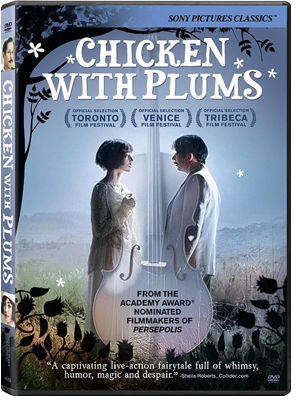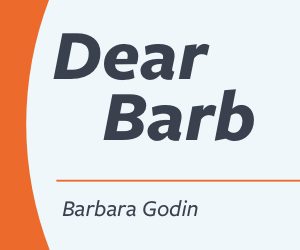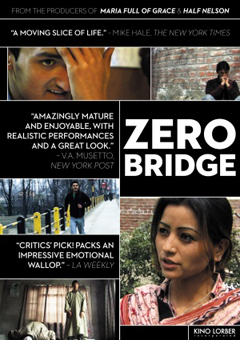 Film: Chicken with Plums
Film: Chicken with Plums
Directors: Marjane Satrapi and Vincent Paronnaud
Cast: Mathieu Amalric, Jamel Debbouze, Goshifteh Farahani, Edouard Baer, Chiara Mastroianni, Isabella Rossellini, Eric Caravaca, Maria De Medeiros
?For a man who no longer has a homeland, writing becomes a place to live.?
Theodor Adorno
The Tragic Waltz of Art and Homeland
Faranguisse is talking to Nasser Ali. She’s practically spitting nails. Having loved him from her childhood because of his beautiful violin playing, she has quickly grown bitterly resentful at his failure?or refusal?to make any contributions of time, money, or effort to the family, compelling her to support the family and still attend to household duties. After having shown herself willing to make sacrifices, She’s perplexed that no one has offered her a ram.
His violin, the original cause of her infatuation with him, is now her rival. Her present wrath reveals an utter failure to appreciate the significance of his gift.
Once again Marjane Satrapi, the Iranian writer of Persepolis, examines the role of the artist in the context of an oppressive political regime, this time with a moving allegory. Nasser Ali is a melancholic violin virtuoso from Tehran. Under his mother’s pressure he marries Faranguisse, a math teacher he doesn’t love, and has two children whom he mostly ignores. One day, after a series of disappointments, he makes up his mind to die.
His story?past, present, and future?is very cleverly told within the eight days it takes him to actually pass from this mortal coil. In this time we learn that his daughter grows up to become a tragic heroine, drowning her disgust in booze, cigarettes, and bitter pronouncements. Nasser’s odious little boy moves to the US, where he marries a vapid cheerleader and raises a brood of brats worthy of trash TV.
We also learn that as a boy he was a bit of a reject, his special gifts eclipsed by those of his more academic and amenable little brother.
As a single student, Nasser fell in ill-fated love with a girl with the highly significant name ?Iran.? She loved him just as dearly, and led a life of quiet despair after her father forbade her to marry the penniless music student. At this juncture Nasser’s violin master tells him, ?From now on the love you lost will be in every note you play.? Art is clearly a kind of spiritual apprenticeship; your pain doesn’t necessarily enrich it, but it can if you desire it to.
After his heart is broken, Nasser becomes a brilliant violinist with a stellar career. But in the end It’s not enough. Artists long for powerful connection, and a lack of such connection is the source of their deepest sadness. This is one thing that makes living with artists so frustrating for those who don’t understand them. It’s even more frustrating?devastating, even?for the artists thus prevented from achieving the connections they require.
The violinist sums up the plight of the artist within an oppressive society. His inamorata represents the true needs of that society for the beauty that he can show them; the resentful wife is the demands of everyday living, which take their toll on the artist and which the artist is especially ill-equipped to fulfill. The film looks at this problem writ large: Can art-haters ever compel a country to forget the deepest and most sincere expressions of love from her artists? Never, according to Chicken With Plums. Never, never, never.
Chicken With Plums manifests ten of the Mindful Bard’s criteria for films well worth seeing: 1) it is authentic, original, and delightful; 2) it poses and admirably responds to questions that have a direct bearing on my view of existence; 3) it stimulates my mind; 4) it harmoniously unites art with social action, saving me from both seclusion in an ivory tower and slavery to someone else’s political agenda; 5) it provides respite from a sick and cruel world, a respite enabling me to renew myself for a return to mindful artistic endeavour; 6) it is about attainment of the true self; 7) it inspires an awareness of the sanctity of creation; 8) it displays an engagement with and compassionate response to suffering; 9) it makes me want to be a better artist; and 10) it makes me appreciate that life is a complex and rare phenomenon, making living a unique opportunity.
Wanda also penned the poems for the artist book They Tell My Tale to Children Now to Help Them to be Good, a collection of meditations on fairy tales, illustrated by artist Susan Malmstrom.


